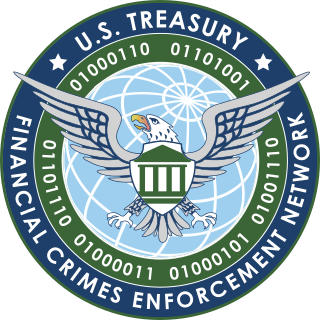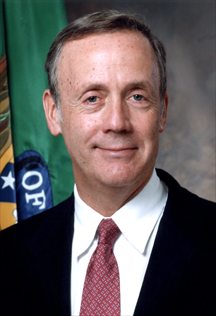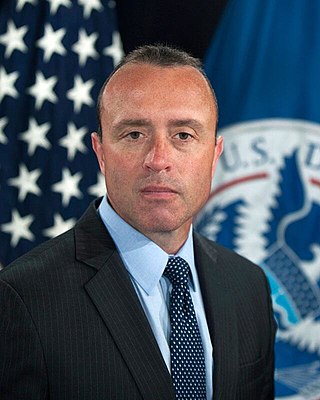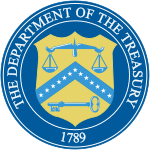
The PATRIOT Act was a landmark Act of the United States Congress, signed into law by President George W. Bush. The formal name of the statute is the Uniting and Strengthening America by Providing Appropriate Tools Required to Intercept and Obstruct Terrorism Act of 2001, and the commonly used short name is a contrived acronym that is embedded in the name set forth in the statute.

The United States secretary of the treasury is the head of the United States Department of the Treasury, and is the chief financial officer of the federal government of the United States. The secretary of the treasury serves as the principal advisor to the president of the United States on all matters pertaining to economic and fiscal policy. The secretary is, by custom, a member of the president's cabinet and, by law, a member of the National Security Council.

The Department of the Treasury (USDT) is the national treasury and finance department of the federal government of the United States, where it serves as an executive department. The department oversees the Bureau of Engraving and Printing and the U.S. Mint. These two agencies are responsible for printing all paper currency and minting coins, while the treasury executes currency circulation in the domestic fiscal system. The USDT collects all federal taxes through the Internal Revenue Service; manages U.S. government debt instruments; licenses and supervises banks and thrift institutions; and advises the legislative and executive branches on matters of fiscal policy. The department is administered by the secretary of the treasury, who is a member of the Cabinet. The treasurer of the United States has limited statutory duties, but advises the Secretary on various matters such as coinage and currency production. Signatures of both officials appear on all Federal Reserve notes.

The United States Department of Homeland Security (DHS) is the U.S. federal executive department responsible for public security, roughly comparable to the interior or home ministries of other countries. Its stated missions involve anti-terrorism, border security, immigration and customs, cyber security, and disaster prevention and management.

The Financial Crimes Enforcement Network (FinCEN) is a bureau of the United States Department of the Treasury that collects and analyzes information about financial transactions in order to combat domestic and international money laundering, terrorist financing, and other financial crimes.
U.S. Immigration and Customs Enforcement (ICE) is a federal law enforcement agency under the U.S. Department of Homeland Security. ICE's stated mission is to protect the United States from the cross-border crime and illegal immigration that threaten national security and public safety.

The Federal Law Enforcement Training Centers (FLETC) serves as an interagency law enforcement training body for 105 United States government federal law enforcement agencies. The stated mission of FLETC is to "...train those who protect our homeland". Through the Rural Policing Institute (RPI) and the Office of State and Local Training, it provides tuition-free and low-cost training to state, local, campus and tribal law enforcement agencies.
The USA PATRIOT Act was passed by the United States Congress in 2001 as a response to the September 11, 2001 attacks. It has ten titles, each containing numerous sections. Title III: International Money Laundering Abatement and Financial Anti-Terrorism Act of 2001 is actually an act of Congress in its own right as well as being a title of the USA PATRIOT Act, and is intended to facilitate the prevention, detection and prosecution of international money laundering and the financing of terrorism. The title's sections primarily amend portions of the Money Laundering Control Act of 1986 and the Bank Secrecy Act of 1970.

The Office of Intelligence and Analysis (OIA) is a component of the United States Department of the Treasury responsible for the receipt, analysis, collation, and dissemination of foreign intelligence and counterintelligence information related to the operation and responsibilities of the Treasury Department.
The USA PATRIOT Act was passed by the United States Congress in 2001 as a response to the September 11 attacks in 2001. It has ten titles, with the third title written to prevent, detect, and prosecute international money laundering and the financing of terrorism.
Financial intelligence (FININT) is the gathering of information about the financial affairs of entities of interest, to understand their nature and capabilities, and predict their intentions. Generally the term applies in the context of law enforcement and related activities. One of the main purposes of financial intelligence is to identify financial transactions that may involve tax evasion, money laundering or some other criminal activity. FININT may also be involved in identifying financing of criminal and terrorist organisations. Financial intelligence can be broken down into two main areas, collection and analysis. Collection is normally done by a government agency, known as a financial intelligence organisation or Financial Intelligence Unit (FIU). The agency will collect raw transactional information and Suspicious activity reports (SAR) usually provided by banks and other entities as part of regulatory requirements. Data may be shared with other countries through intergovernmental networks. Analysis, may consist of scrutinizing a large volume of transactional data using data mining or data-matching techniques to identify persons potentially engaged in a particular activity. SARs can also be scrutinized and linked with other data to try to identify specific activity.

James F. Sloan was an American intelligence official who served as the Assistant Commandant for Intelligence and Criminal Investigations for the United States Coast Guard and head of Coast Guard Intelligence from November 17, 2003 to February 27, 2009. He was responsible for directing, coordinating, and overseeing intelligence and investigative operations and activities that support all U.S. Coast Guard mission objectives, the national strategy for Homeland Security, and National Security objectives.
Executive Schedule is the system of salaries given to the highest-ranked appointed officials in the executive branch of the U.S. government. The president of the United States appoints individuals to these positions, most with the advice and consent of the United States Senate. They include members of the president's Cabinet, several top-ranking officials of each executive department, the directors of some of the more prominent departmental and independent agencies, and several members of the Executive Office of the President.
Operation Green Quest was a U.S. interagency investigative unit formed in October 2001 after the September 11 attacks. Sponsored by the United States Customs Service, it was concerned with the surveillance and interdiction of terrorist financing sources. It was disbanded in June 2003 pursuant to an agreement between the Department of Homeland Security and the Department of Justice.
The counter-terrorism page primarily deals with special police or military organizations that carry out arrest or direct combat with terrorists. This page deals with the other aspects of counter-terrorism:
The Office of Terrorism and Financial Intelligence (TFI), formed in 2004, is an agency of the United States Department of the Treasury. TFI works to reduce the use of the financial system for illicit activities by terrorists, money launderers, drug cartels, and other national security threats.

The federal government of the United States empowers a wide range of federal law enforcement agencies to maintain law and public order related to matters affecting the country as a whole.

Jimmy Gurulé is an American attorney, academic and government official, who is a professor at Notre Dame Law School, teaching criminal law courses. He was the first Hispanic Assistant Attorney General in the United States.

David Aufhauser, American lawyer, served as the General Counsel of the United States Treasury Department from 2001 to 2004. After 9/11, Aufhauser was a key player in disrupting and freezing further terrorist activity against the United States. He is best known for running the federal government's programs to go after terrorist financing, a major strategy in the war on terror. He ran the National Security Council Committee on Terrorist Financing; oversaw the legal departments of important agencies and divisions within the U.S. Treasury Department including International Banking, Domestic Banking, the U.S. Customs Service, IRS criminal and civil divisions, ATF, Financial Crimes and Money Laundering, and United States Secret Service; and supervised the federal government's multi-agency antiterrorism task force. In his numerous briefings before the House and Senate, he emphasized the importance of teaching tolerance and respect, often making clear distinctions between the vast majority of peaceful people in the Middle East and the practitioners of “counterfeit religion” who preyed on hopelessness to recruit terrorists.

David J. Glawe was the Under Secretary of Homeland Security for Intelligence and Analysis from January 2017 to May 2020 and is currently the President and CEO of the National Insurance Crime Bureau.












